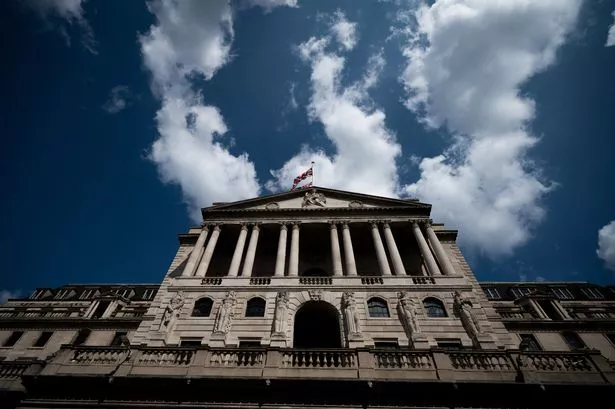
Pound sterling drops as US inflation accelerates unexpectedly, Fed rate cuts in question
The pound sterling took a hit on Wednesday afternoon following the release of new data indicating an unexpected rapid acceleration in inflation within the world's largest economy. The Bureau of Labor Statistics reported US inflation reached 3.0 per cent in January, a climb from 2.9 per cent, surpassing economists' forecasts, as reported by City AM. The data revealed a 0.5 per cent price rise in January, the most substantial monthly increase since August 2023. Moreover, core inflation, which omits volatile items like food and energy, ascended to 3.3 per cent from 3.2 per cent the previous month, again outstripping expectations. "Indexes that increased over the month include motor vehicle insurance, recreation, used cars and trucks, medical care, communication, and airline fares," commented the Bureau. These figures stand as a significant worry for the Federal Reserve, considering their ongoing alarm concerning the enduring nature of inflationary pressures. In a recent address to Congress, Fed chair Jerome Powell remarked there was no "need to be in a hurry" to trim rates, even after last year's cut of the federal funds rate by 100 basis points. Market analysts now foresee only a single rate cut this year, likely to occur in December. Post-release of these statistics, the dollar saw strength against the pound, with sterling dropping 0.5 per cent to $1.238. Typically, higher US interest rates bolster the dollar, as traders can secure higher returns on investments. Concerns are mounting among analysts that President Trump's fondness for tariffs could lead to increased inflation in the months ahead, potentially prompting the Federal Reserve to raise interest rates once more. "What makes today’s rise in CPI inflation data so precarious is that many believe this is just the beginning, as tariffs could push inflation even higher," commented Jochen Stanzl, chief market analyst at CMC Markets. Trump has already implemented tariffs on imports from China and introduced a new 25% tax on steel and aluminium imports. Further measures targeting the EU are anticipated to be unveiled later this week.

North West law firm Harrison Drury completes management buyout
North West law firm Harrison Drury has been acquired by six members of its management team in moves heralding and “exciting new chapter”. The MBO was led by partner and head of the firm’s property and construction division, Simon England, together with existing partners Nick Booth, Hannah Hughes, Malcolm Ireland, Rick Life and Mark Traynor. Simon England, who is a current shareholder, will become managing partner, while current majority shareholder and executive chairman John Chesworth will become senior partner and support the new ownership team. Harrison Drury has grown since John Chesworth acquired the firm in 2007 from Eddie Starkie. Under Mr Chesworth’s leadership, it has grown from a firm of 12 staff in one office in Preston to a team of 190 staff across eight offices in Clitheroe, Garstang, Kendal, Lancaster, Lytham, Manchester, Preston and Southport. In 2024, the firm was named 28th in the UK’s top 100 Best Mid-sized Companies to Work For, also placing it in the top five for UK mid-sized law firms. Mr England said: “Independence is at the heart of who we are. Retaining this ensures we can uphold our commitment to being a truly people-centred organisation. This enables our lawyers to enjoy the freedom of serving our clients – owner-managed businesses, entrepreneurs, and high-net-worth individuals – the way they know best. “The firm has embarked on a remarkable journey under John’s leadership, thriving in an intensely competitive legal marketplace and earning a reputation as a leading employer. This reputation attracted me to the firm in 2013, as it did for the exceptional professionals who work across all our teams and offices. “Since becoming a shareholder in 2014, John and I have focussed on recruiting, developing and retaining talented people who share our values. Today, we’re proud to have a hugely talented and aligned ownership team and partner group, well prepared to guide the firm into an exciting new chapter.” Mr Chesworth said: “From the very beginning, my vision for Harrison Drury was to establish it as a leading regional law firm in the SME market. Central to this vision has been the focus on attracting, growing and retaining outstanding people, something that has led to the emergence of leaders across the business. I am incredibly proud to see some of those who have been integral to our success now poised to lead the firm into an exciting new era. “Across the firm, we are united by a shared commitment to our ethos of building teams of good people, keeping them engaged and enabling them to deliver excellent client service, while making a positive impact in our communities. “Since 2007, we’ve navigated an extraordinary period of change, from the global financial crisis and Brexit to the pandemic and technological transformation, not to mention six changes in prime minister. “Through it all, our culture has been the bedrock of our success, driving positive growth, staying true to our core values and supporting our clients, partners and communities and that will continue to be the case.” Mark Traynor, who joined Harrison Drury in late 2023 to head up the firm’s corporate team, added: “In an active legal marketplace with lots of consolidation, we wanted to bring through our own ownership team and find the new custodians of the firm who will protect and enhance its established values and mission, and lead from the front.

West Midlands Lloyds and Halifax branches to close
A host of Lloyds and Halifax branches across Birmingham and the West Midlands have been tabled for closure over the coming months. The group is among 136 which the banking group has confirmed will be shut down. The first to close will be Lloyds and Halifax branches in High Street, Bromsgrove, at the end of May. They will be followed by Halifax, in Erdington's High Street in September, and Lloyds in Vicar Street, Kidderminster, just a few weeks later. Lloyds branches in Foleshill Road, Coventry, and High Street, Shipston-on-Stour, will both close in the first half of November and finally Halifax in Bearwood Road, Smethwick, will cease trading in March next year. Email newsletters BusinessLive is your home for business news from across the West Midlands including Birmingham, the Black Country, Solihull, Coventry and Staffordshire. Click through here to sign up for our email newsletter and also view the broad range of other bulletins we offer including weekly sector-specific updates. We will also send out 'Breaking News' emails for any stories which must be seen right away. LinkedIn For all the latest stories, views and polls, follow our BusinessLive West Midlands LinkedIn page here. Across the wider region there are branches in Staffordshire, Shropshire and the East Midlands also earmarked for closure. In total, 61 Lloyds, 61 Halifax and 14 Bank of Scotland branches will shut their doors for good between May and March 2026. The closures come weeks after Lloyds Banking Group said it would allow customers of Lloyds, Halifax and Bank of Scotland to use stores across any of its brands for in-person banking. The group has blamed the move on customers shifting away from banking in person to using mobile services but stressed it would offer affected workers roles elsewhere in the company. A statement said: "Over 20 million customers are using our apps for on-demand access to their money and customers have more choice and flexibility than ever for their day-to-day banking. "Alongside our apps, customers can also use telephone banking, visit a community banker or use any Halifax, Lloyds or Bank of Scotland branch, giving access to many more branches. "Customers can also do their everyday banking at over 11,000 branches of the Post Office or in a banking hub." The announcement means that more than 1,700 bank branches have shut or announced their intention to close since February 2022 when a voluntary agreement saw the major banking groups commit to assessing the impact of every closure. This has included both Lloyds and Halifax branches in Birmingham city centre and elsewhere across the region. It works out at an average of around 50 closures announced per month, with around 289 branches expected to shut this year.

Plus500 boosts shareholder returns with new $200m payout following revenue surge
Plus500 has unveiled another series of shareholder rewards following a surge in new customers and an uptick in revenue. The fintech trading platform reported a six per cent year-on-year increase in revenue to $768.3m (£609.3m), bolstered by a similar rise in trading income, as reported by City AM. Interest income climbed by nine per cent, albeit representing a smaller portion of the company's earnings. The firm experienced a 30 per cent growth in new customer numbers over the year, with figures rising to 118,010 from 90,944. Attracting new clients has been a key priority for Plus500, which has made substantial investments in marketing to draw in new traders. "Our commitment to continued strategic investment has established the foundations for growth in future years," said David Zruia, the chief executive. Investments have also been channelled into 'customer retention technologies', ensuring that two-thirds of its revenue from over-the-counter products comes from clients who have been trading for more than three years. Active customer numbers increased by nine per cent to 254,138, while the average deposit per active customer rose to $12,000, up from $10,000 the previous year. Plus500's non-OTC operations, encompassing futures and share dealing, likewise saw robust expansion. Last year, these activities accounted for approximately 10 per cent of total revenue and 15 per cent of all new customers. Stuart Duncan, an analyst at Peel Hunt, commented: "The investment case remains based on growth in non-OTC business, as well as strong cash generation." Plus500 reported a 1% increase in earnings before interest, taxes, depreciation, and amortisation (EBITDA) to $342.3m. Panmure Liberum analysts noted that the EBITDA rise came "despite heavy customer acquisition investment in Q4". Following its results, the company announced shareholder returns worth $200m, comprising a $110m share buyback programme and $90m in dividends.

Bank of England still likely to cut rates despite surging wages, says Bailey
Andrew Bailey, the Governor of the Bank of England, has indicated that the institution is still poised to lower interest rates again this year, despite a surge in pay growth and an expected rise in inflation. Speaking at an event in Brussels, Bailey addressed the recent labour market figures showing a significant increase in wage growth, suggesting they are unlikely to alter the Bank's policy direction: "Pay growth went up, but actually not quite as much as we were expecting," he remarked. The Office for National Statistics (ONS) reported that regular pay growth in the private sector reached 6.2 per cent in the final quarter of the year, marking the highest level since November 2023. However, this figure was marginally below the 6.3 per cent forecast by Bank of England experts, as reported by City AM. Bailey referred to the Bank's forward-looking survey on pay pressures, which indicates that wage pressures are expected to diminish over the next year: "One of the best anchors we have is the survey that our agents around the country do every year, and they think settlements this year are going to come down," he explained. The Bank of England projects that annual wage growth will decrease to 3.7 per cent across 2025, from 5.3 per cent for the current year. "I don't think we saw anything this morning that fundamentally changes that," Bailey added. His comments precede the release of the latest inflation figures, set to be published tomorrow morning. Analysts in the City predict that the headline rate will increase to 2.8 per cent, driven by recovering services prices. The Bank's projections indicate that inflation will climb to 3.7 per cent later in the year, primarily due to escalating energy prices. Bailey clarified that this surge in inflation does not signify "a story about the fundamental state of the economy," as it largely mirrors changes in regulated prices, such as energy bills. He further noted that the inflation hike would occur against "a background...which is weaker in growth terms than we thought it would be" which should curb its longevity. Earlier this month, the Bank of England reduced interest rates for the third time, lowering the Bank Rate to 4.50 per cent.

Barclays latest firm to tighten office attendance rules with three-day minimum
Barclays has become the latest major company to tighten its office attendance policy, requiring staff to be in the office at least three days a week. The British-based bank revealed a stricter approach to hybrid working in a memo to staff earlier this week, reducing the minimum number of days staff can work from home from three to two, as reported by City AM. Many Barclays employees, including those in client-facing and investment banking roles, already spend four or five days a week in the office, but the official company-wide policy had only required two days. The decision to increase this to three, first reported by the Financial Times, comes as many major UK firms grapple with their approach to hybrid working as the pandemic's impact recedes. Earlier this month, City AM reported that WPP boss Mark Read had informed his 100,000-strong workforce that they would need to work from the office at least four days a week from April. This announcement, made via a company-wide memo, sparked a strong backlash from Read’s staff, resulting in a public petition that garnered nearly 20,000 signatures. Shortly after WPP announced its new policy, Barclays' competitor Lloyds stated that senior staff could have their bonuses reduced or withdrawn if they do not work from the office at least twice a week. The UK’s largest mortgage lender told managers it expected them to set an example for younger staff. Within the finance sector, investment banks such as JP Morgan, Morgan Stanley, and Goldman Sachs led the charge back to a five-day in-office workweek, signifying a split from their retail banking counterparts. Goldman Sachs' leader David Solomon referred to remote working as an "aberration" as early as 2021, at a time when other firms in similar industries lacked definitive hybrid work strategies. Jamie Dimon of JP Morgan has been vocal about his doubts regarding home-based work and recently supported Donald Trump and Elon Musk in urging all federal workers to return to full-time office work.